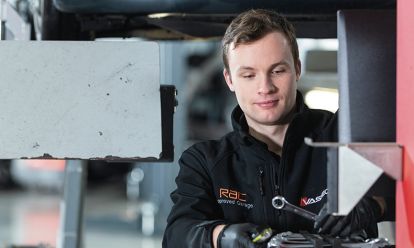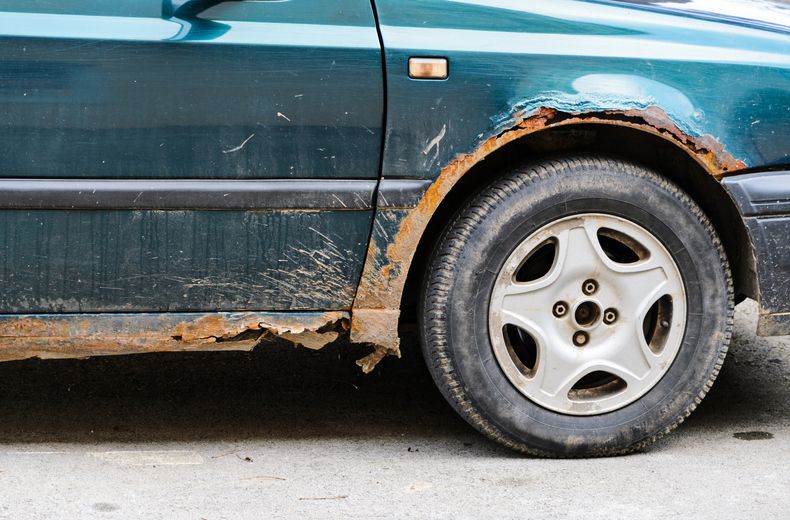In other words it doesn't matter how nice your car is, rust will come for us all eventually... or something like that.
Here, we run through the car parts most prone to rusting, what rust could mean for your car and our tips for preventing the dreaded corrosion.
At what age do cars start to rust?
There is no set age when cars begin to rust. Over the years, wear and tear can damage protective coatings and leave metal exposed to moisture.
Although older models were made before rust-proofing materials were typically used in the manufacturing process, the most-likely reasons for your car turning into a rust bucket depends on other factors.
What causes rust on a car?
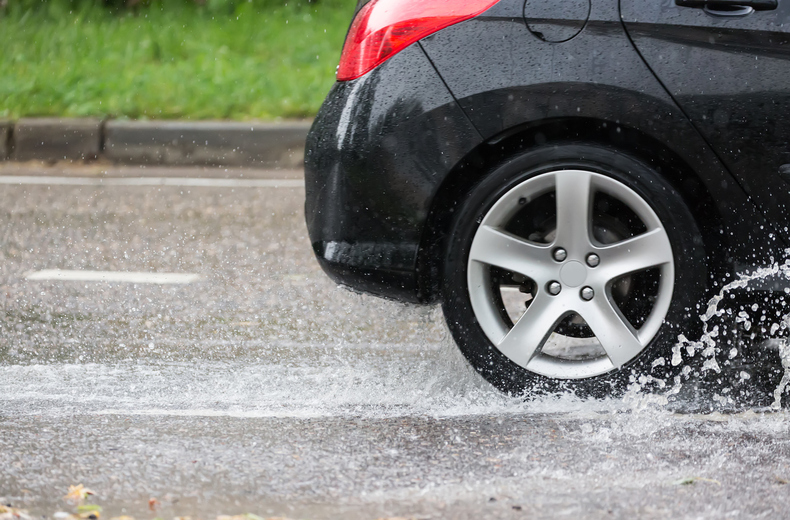
Rust develops when iron reacts with oxygen and water. The oxidising appears as a reddish-brown coat that can lead to corrosion.
This damage usually happens in cars because of a combination of factors:
- Climate – Regular exposure to rain, sleet and snow will increase the chances of moisture oxidising with metals on your car. Salts used to grit icy roads can also speed up the corrosion process, while higher temperatures generally lead to higher rates of corrosion too.
- Age – Over time paintwork and protective coatings can suffer from wear and tear. If metalwork is exposed to moisture it will eventually rust and corrode.
- Materials – Older cars were generally made without non-reactive coatings, leaving them more vulnerable to rusting. Newer cars also use arch liners to prevent damage to the wheel wells.
- Driving style – If you tend to drive off-road or through puddles you could be increasing your corrosion risk.
Types of rust
Generally speaking, there are three kinds of rust:
- Surface rust – Affects the top layer of your car and usually occurs in bumps and nicks to body panels. Treating the damage at this stage will give you the best hope of avoiding the spread.
- Scale rust – This is when surface rust has been left long enough to eventually corrode the metal on body panels. Salt found in road salt is notorious for speeding up the corrosion process and could affect the integrity of the metal itself.
- Penetrating rust – This is the most advanced and most damaging type of rust for your car. If you leave surface and scale rust to develop, you might need to replace entire parts and body panels.
Common rust locations
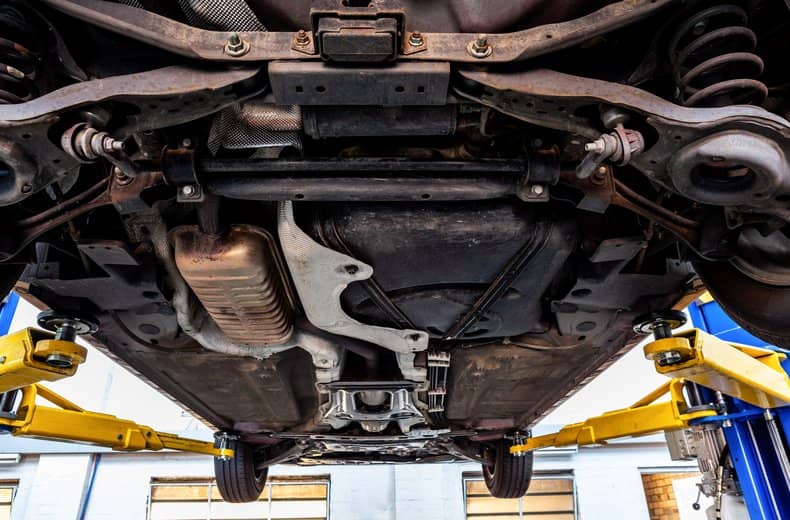
Rust can occur anywhere on the body of a car. In fact, surface rust is often the tip of the iceberg, as it’s common for oxidisation to form inside a panel or part and work its way outward.
The most important thing to look out for is any exterior paint-bubbling. This is often an early sign of rust.
Beyond looking over your car's bodywork, there are a few areas you should pay extra attention to. Check these parts from underneath your car:
- Frame rails – Run underneath both sides of a car underneath the doors
- Wheel wells – The curves above your tyres are prone to rusting, especially in older cars that typically don’t have arch liners
- Exhausts – Your tailpipe is exposed to moisture from the inside and outside of the car which can be trapped by mud and dirt
- Suspension – Tends to make contact with moisture because of its proximity to tyres that can flick up dirt and other elements on the underside of the car
You should also check the following:
- Floor of the boot – Make sure you pull up any carpet to look for any signs of rust
- Windscreen – The areas around glass are prone to leaking and greater exposure to moisture
- Doors – Check inside and out
How to spot rust on your car
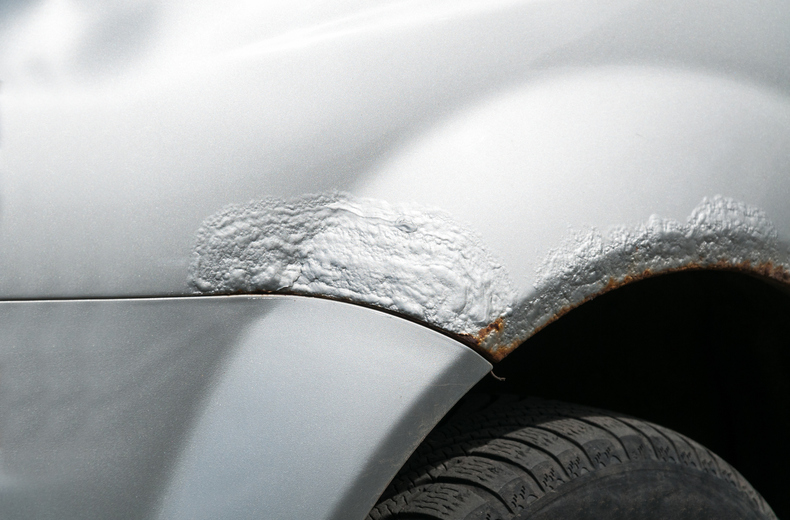
- Bubbles – illustrated in the picture above, bubbles under the paint usually indicates that paint has lost contact with the panel underneath because water and air have gathered in between. It won’t be long before the area is covered in rust
- Puddles – dampness or water damage on the carpet, in footwells or the boot is usually a sign that the metal underneath has rusted
- Body damage – look for nicks and dents as these often lead to rust when left unattended
- Irregular paint – spots and strips of paint that don’t match the original paintwork could be the work of a rust repair job. It may come back if not properly repaired or sealed
Should I buy a car with signs of rust?
If you’re looking to buy a car and notice signs of rust you should ask yourself a few important questions before deciding whether to part with your cash:
How bad is the damage?
Rust on the surface of the car should be easy to fix, while more serious damage or discolouring to structural parts of the vehicle could mean major repairs are needed.
Make sure you look for signs of a cover up or previous damage that has since been repaired.
Can I haggle the price down?
Once you’ve assessed the damage you could try asking for a discount on the car’s sale price based on the cost of repairs.
Am I happy to drive a car with rust damage?
Between buying a second-hand car and repairing any damage, you could be driving a vehicle with visible signs of rust. Ask yourself if you’re comfortable driving a noticeably-damaged car before shaking hands on a price.
Rust and corrosion treatment
Whether rust can be repaired depends on the level of corrosion to your vehicle and where the damage has struck.
Surface rust on paintwork can be easily repaired, while more severe damage on structural parts of the car may need to be completely replaced.
It’s best to visit a trustworthy garage to assess if the damage can be fixed.

RAC sale – up to 33% off*
• Roadside cover from £5.29 a month†
• We get to most breakdowns in 60 mins or less
• Our patrols fix 4/5 breakdowns on the spot

Rust and corrosion repair cost
The costs of repairs will depend on the location and extent of damage.
Repairing damage yourself may work out cheaper after shopping around for tools and materials, especially when you consider bodywork specialists can charge anything from £36 to £200 per hour for their expertise.1
If damage can’t be repaired, you might have to consider coughing up for replacement parts.
Can I repair rust and corrosion myself?
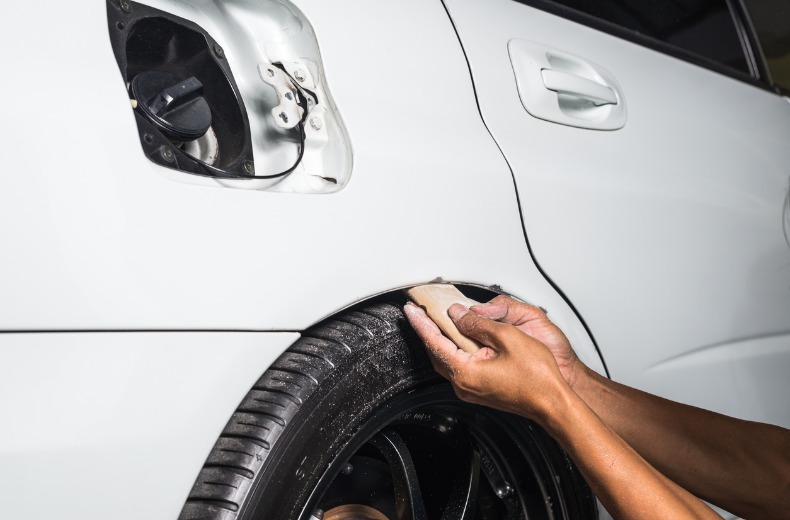
If you manage to catch rust early there’s no reason why you can’t make any repairs yourself.
Be warned, you may need more equipment than you bargained for. Car experts Haynes list 13 different tools and materials for the job:
- Angle grinder and flapper wheels
- Wire brush
- Fibreglass epoxy gel
- Body filler
- Various grade sandpaper (80, 400, 600, 1000, 2000)
- Sanding block
- Primer and base coat paint
- 2k clear coat paint (available in aerosol cans)
- Masking materials (paper and tape)
- Rubbing compound
- Mineral spirits
- Rags
- Tack cloth
You’ll need an abrasive surface to remove rust before filling with a glass fibre repair gel. Sanding, filling, more sanding, plus primer and base coats are needed before you can finish the repair with a protective clear coat.
See Haynes’ step by step process for repairing rust damage for more information.
A body shop or trusted garage will be able to help if you find the idea of a DIY fix too complicated.
Should I repair rust and corrosion myself?
The decision to repair rust damage yourself depends on a combination of a few things:
- Extent of damage – surface rust should be easy enough to remove yourself but more extensive damage will probably need the help of an expert.
- Budget – rates for bodywork specialists greatly vary, in fact, you could pay between £36 to £200 an hour for their help.
- Confidence – even the simplest repair job can seem out of the question if you’re not comfortable making repairs yourself, in which case you should arrange for professional help.
- Time – sourcing all the tools and materials can take a while, especially if you shop around for the best deal. That’s before you’ve even started to master the techniques for a high-quality repair job.
How to prevent rust
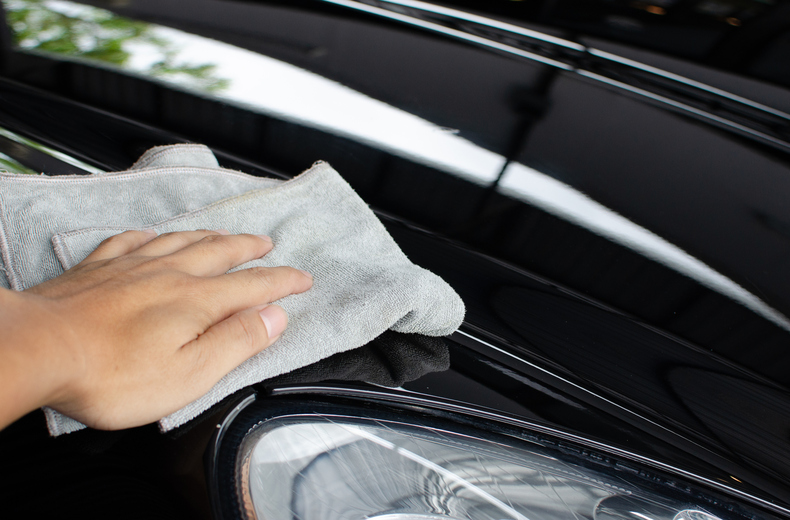
Thankfully, there are a few things you can do stop rust and corrosion from forming.
Rinse and dry
If you live by the sea or have been driving in adverse weather you should try to give your car a quick rinse with water. A once-over with a hose will prevent the dirt and grime of the day settling on your paintwork and eventually rusting.
Just remember to finish the job with a quick chamois rub over.
Add a coat of wax
A coat of wax will add a protective layer to your paintwork. You can even try using a wax injection gun to reach those areas where moisture is likely to collect over time.
Apply oil
WD40 is a great tool in the fight against rust and corrosion, in fact, the WD stands for ‘water dispersant’. Applying the solution with a smart straw will help you drive out moisture from hinges, joints and other hard-to-reach areas.
Keep your car dry
Parking your car in a garage will help protect it from the elements but you might want to go further to ensure it’s safe from rust. After you’ve parked your car in a garage you can try using a dehumidifier to remove any moisture in the air.
The RAC Shop is filled with items to help maintain the exterior of your car.
Is rust the end for a car?
If your car only shows early signs of corrosion, such as paint bubbling or surface rust, you should be able to fix the problem before it gets too serious. It’s even possible to repair light damage yourself.
You should check how severe any damage is before attempting any DIY work but remember, the quicker you address the problem the greater your chances of fixing it.
If you’re unsure about how to do the job yourself, an RAC approved garage will be happy to help restore your car where possible.
Are you experiencing a car fault, warning, or mechanical problem on your road trip? Find a local mechanic with the RAC.
Car playing up?
Get quality repairs at a fair price, plus a 12 month warranty with RAC Approved Garages.
